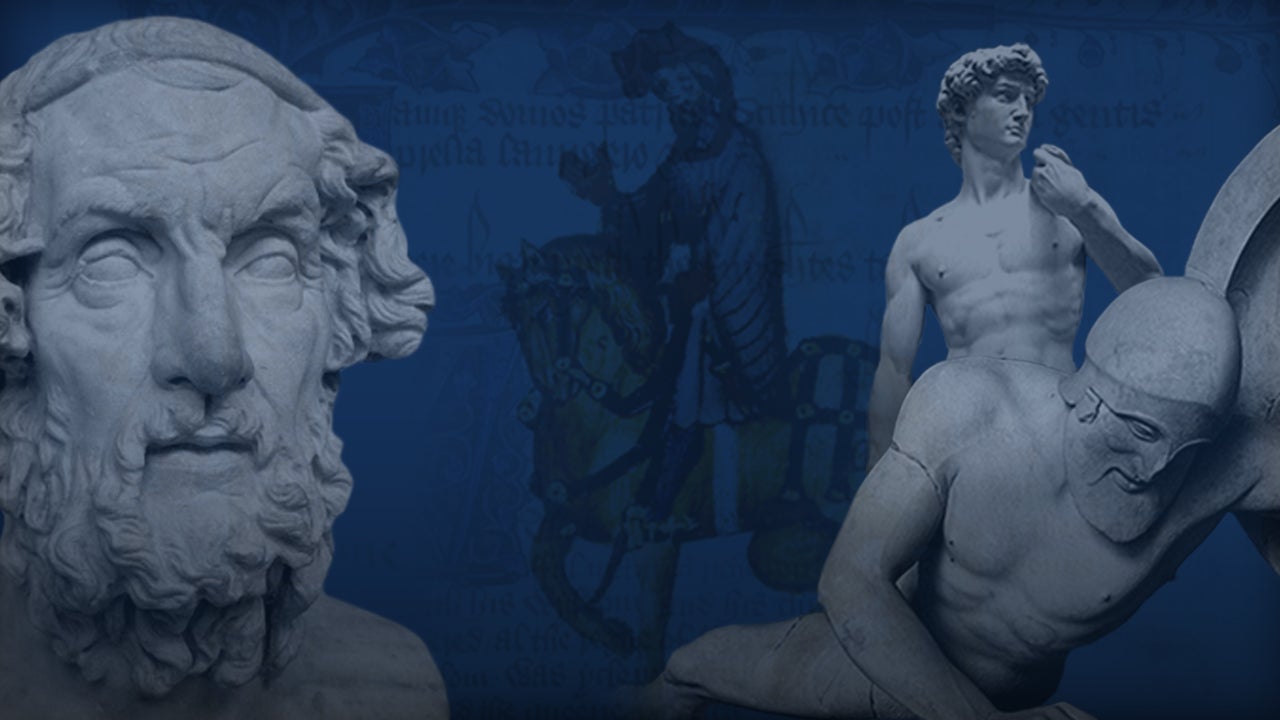
Literature
Great Books 101: Ancient to Medieval
11 lessons
10h total length
Create Your Account to Get Instant Access to “Great Books 101: Ancient to Medieval”
Encounter the Greatest Works of Western Literature
Lessons in this course

39:35
lesson 1
Literature and the Liberal Arts
The word “literature” comes from the Latin word that means writing. Writing is akin to reason and speech, which are distinctively human gifts: they distinguish us from other animals on earth. The phenomenon of literature is essentially human.

50:29
lesson 2
Homer’s Iliad
Homer’s Iliad can be best understood by examining some of its major major themes: rage, desire, delusion, deception, disaster and double-dealing, death and outrage, responsibility and evasion, and ultimately, glory. The poem tells the story of the Trojan War, and of Achilles, the greatest warrior of the Greeks.

34:24
lesson 3
Homer’s Odyssey
Homer’s Odyssey—which tells the tale of the Greek hero Odysseus and his journey home after the fall of Troy—is one of the great works of Western Civilization. With this poem, Homer establishes the context in which the great cultural and political flowering of 5th century Athens takes place.

35:20
lesson 4
Sophocles, Oedipus Rex
Oedipus Rex is a tragedy written by Sophocles in Athens in the 5th century BC. The play tells the story of Oedipus, who is prophesied at birth to kill his father and commit incest with his mother. As is characteristic of ancient Greek drama, the play shows a man caught in inescapable imperfection.

36:57
lesson 5
Virgil, the Aeneid
The Aeneid was written by the Roman poet Virgil in the 1st century BC and tells the story of the journey of Aeneas, legendary founder of Rome, following the fall of Troy. One major lesson of Virgil’s poem is that personal injustice has more than personal consequences. This lesson is illustrated by Aeneas’ self-indulgent dalliance with Dido, which Virgil connects to the future wars between Rome and Carthage.

40:20
lesson 6
The David Story (1 and 2 Samuel & 1 Kings 1-2)
David is one of the most well-known figures of the Old Testament. The story of David’s life is not only a spiritual narrative about the triumph of righteousness and tragedy of sin, but also a great literary masterpiece concerning human nature, family relationships, and the anguish of the soul.

47:00
lesson 7
The Book of Job
The story of Job interrupts the Old Testament historical sequence found in Genesis through Esther. A literary and theological masterpiece, the Book of Job is the first of the “wisdom books.” Wisdom is a common characteristic of the righteous throughout the Old Testament, and it is a sign of God’s favor. Job is introduced as the greatest man in the East, who lives a righteous life, has great wealth, and is favored by God.

37:59
lesson 8
Saint Augustine, Confessions
Saint Augustine’s Confessions, written over 16 centuries ago, remains one of the great books of the Western tradition. In Confessions, Augustine—a master rhetorician and diligent student of philosophy and literature—takes the reader on a prayerful journey of edifying penitence, during which he considers the nature of man and his relationship with God.

43:16
lesson 9
Dante, Inferno
According to T.S. Eliot, only Shakespeare is the equal of the Italian poet and statesman Dante, whose most famous work is the Divine Comedy. Dante’s Inferno, the first of the Divine Comedy’s three parts, occurs just before a great crisis in Dante’s life, a crisis which would lead to his exile from Florence. Dante prods the reader to take a journey of necessity through hell for the sake of gaining self-knowledge. During this journey, Dante is struck with the realization that both love and freedom can prove to be one’s undoing.

47:07
lesson 10
Chaucer, The Canterbury Tales
Chaucer’s Canterbury Tales, a collection of stories told by 29 fictional pilgrims who are traveling to worship at the Shrine of Canterbury, is a work of immense intellectual intricacy. A master at introducing and manipulating multiple frames of reference, Chaucer develops “The Knight’s Tale” in part through a transformation of works by Boethius and Boccaccio.

44:01
lesson 11
Sir Gawain and the Green Knight
Written by an unknown author, the poem Sir Gawain and the Green Knight is one of the finest chivalric romances in the English language. The poem is set at Christmas time in the fabled kingdom of Camelot. During a royal festival, King Arthur and his knights are suddenly interrupted by a seemingly noble visitor, the Green Knight.
Enroll in "Great Books 101: Ancient to Medieval" by clicking the button below.
What Current Students Are Saying
Takes the student through the full context of the course subject matter. Wonderful insight into how we strayed and its consequences and offers a solution.
Create your FREE account today!
All you need to access our courses and start learning today is your email address.